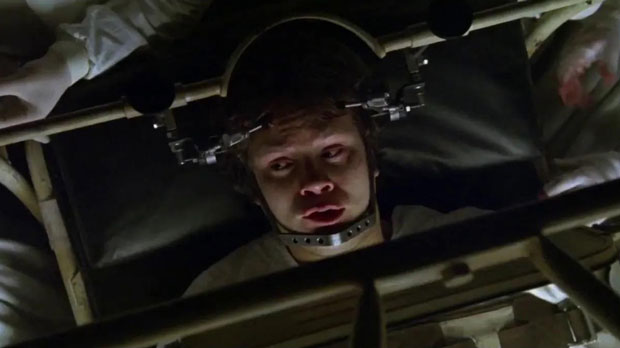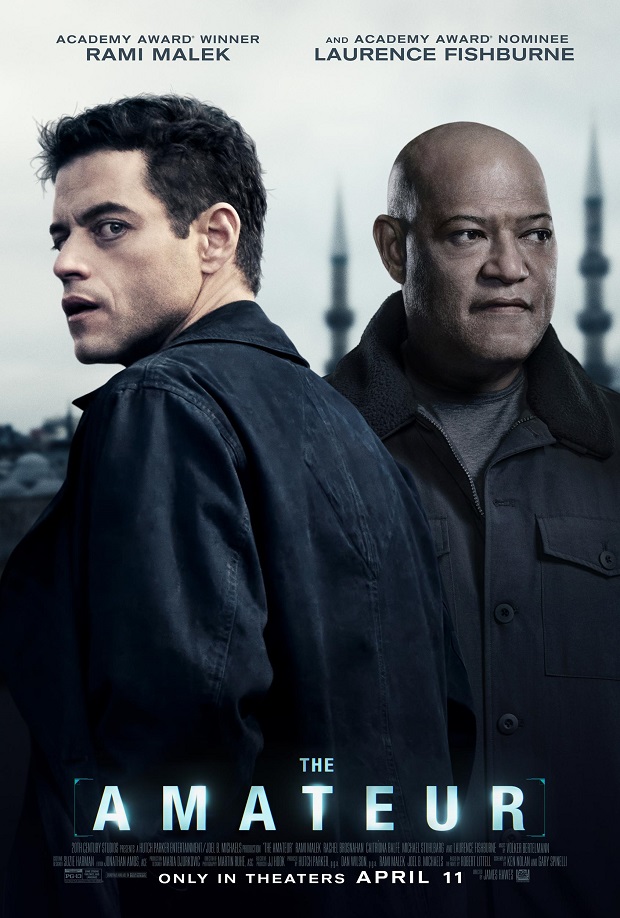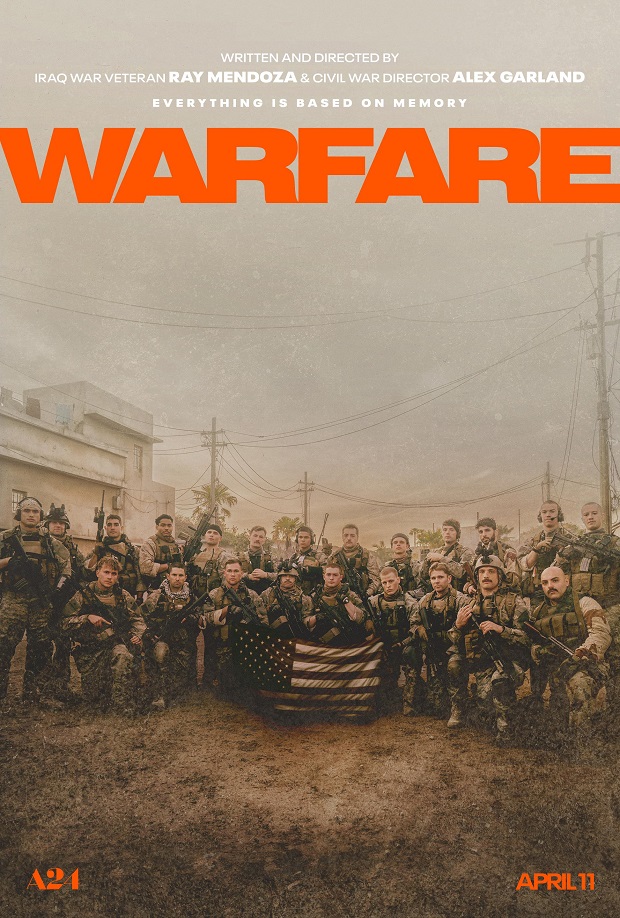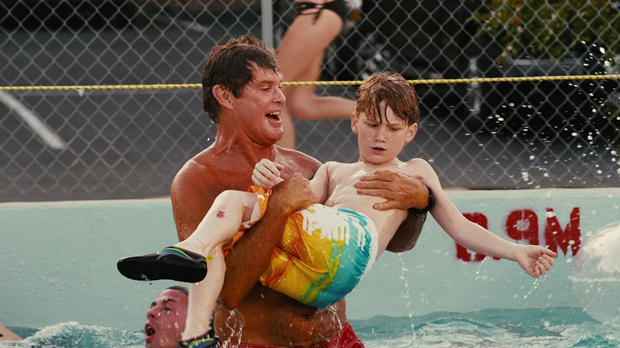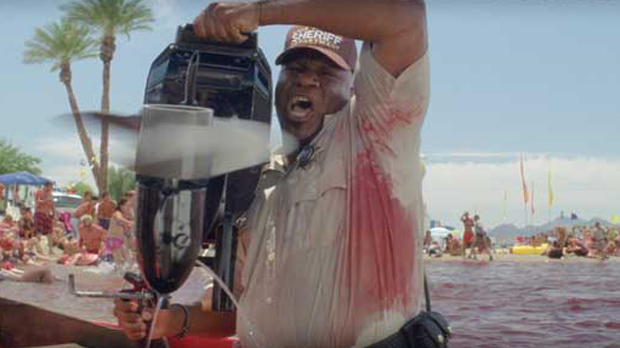 Jacob’s Ladder (1990) TriStar/Horror RT: 116 minutes Rated R (some strong graphic violence and disturbing images, nudity, sexual content, language, drug references) Director: Adrian Lyne Screenplay: Bruce Joel Rubin Music: Maurice Jarre Cinematography: Jeffrey L. Kimball Release date: November 2, 1990 (US) Cast: Tim Robbins, Elizabeth Pena, Danny Aiello, Matt Craven, Pruitt Taylor Vince, Jason Alexander, Patricia Kalember, Macaulay Culkin (uncredited), Eriq LaSalle, Ving Rhames, Brian Tarantina, Anthony Alessandro, Brent Hinkley, S. Epatha Merkerson, Suzanne Shepherd, Doug Barron, Bryan Larkin, B.J. Donaldson, Gloria Irizarry, Evan O’Meara, Kyle Gass, Lewis Black. Box Office: $26.1M (US)
Jacob’s Ladder (1990) TriStar/Horror RT: 116 minutes Rated R (some strong graphic violence and disturbing images, nudity, sexual content, language, drug references) Director: Adrian Lyne Screenplay: Bruce Joel Rubin Music: Maurice Jarre Cinematography: Jeffrey L. Kimball Release date: November 2, 1990 (US) Cast: Tim Robbins, Elizabeth Pena, Danny Aiello, Matt Craven, Pruitt Taylor Vince, Jason Alexander, Patricia Kalember, Macaulay Culkin (uncredited), Eriq LaSalle, Ving Rhames, Brian Tarantina, Anthony Alessandro, Brent Hinkley, S. Epatha Merkerson, Suzanne Shepherd, Doug Barron, Bryan Larkin, B.J. Donaldson, Gloria Irizarry, Evan O’Meara, Kyle Gass, Lewis Black. Box Office: $26.1M (US)
Rating: ****
By way of putting the recent awful remake out of my mind, I decided to rewatch the original Jacob’s Ladder, one of my all-time favorite horror films (second to Stanley Kubrick’s The Shining). It is, in a word, brilliant. I’ve seen it a few times in the nearly 30 years it’s been around and I notice something new each time. It’s so layered in meaning and symbolism that I expect to find more new things in the 30 years to come.
Directed by Adrian Lyne (Fatal Attraction), Jacob’s Ladder is the kind of film that’s subject to debate and open to interpretation. There is NOTHING straightforward about this picture. A general plot synopsis might read like this: a traumatized Vietnam vet experiences hallucinations that might be related to secret drug experimentation conducted by the government on soldiers. That isn’t even a tenth of the picture. There’s so much more going on. Yes, Jacob Singer (Robbins, Bull Durham) is experiencing hallucinations after his discharge from the Army. Yes, something terrible happened over there but what? He’s not sure; all he knows is that he’s trapped in some kind of Kafka-esque nightmare with faceless people/demons trying to kill him. He finds some measure of comfort in his girlfriend Jezebel (Pena, La Bamba) who he moved in with after leaving his wife and two sons. He’s still grieving for the young son, Gabriel (Culkin, Home Alone), that died before he went to Vietnam. He’d like to get to the bottom of what’s ailing him but he’s stopped at every turn by the cruel hand of fate (or something else).
Okay, here’s the deal. I don’t want to ruin Jacob’s Ladder for the few who haven’t seen it. At the same time, I’d like to help my readers gain a better understanding of it. I thought about it and here’s what I’m going to do. First, I’m going to give you a quote from 14th century Christian mystic Meister Eckhart (heard twice in the movie) that’s as apt an explanation as any. It goes:
“If you’re frightened of dying and you’re holding on, you’ll see devils tearing your life away. But if you’ve made your peace, then the devils are really angels, freeing you from the earth.”
What I’ve just given you is a key to unlock the mystery of Jacob’s Ladder. Next, I’d like to point out some of the influences on the movie and its visuals.
– When riding the subway at the beginning, Jacob is shown holding a copy of The Stranger, a novel by French philosopher Albert Camus. In it, the protagonist is awaiting his death by execution, unwillingly at first, only finding peace when he accepts it.
– The title Jacob’s Ladder refers to the Biblical character Jacob and a dream he had of a ladder ascending to Heaven. Notice all the images of stairs and elevators.
– The members of Jacob’s family have Biblical names as well. His wife (Kalember, Fletch Lives) is Sarah, his two surviving sons are Jedidiah and Eli. His late son is named for the archangel Gabriel, the messenger of God.
– In the Bible, Jezebel is a temptress, liar and schemer. She promoted idol worship, specifically Baal when he was in the underworld. In the movie, it’s she who tries to make Jacob forget about his previous life as a family man by seducing him and burning old photos- i.e. memories.
– The paintings of Francis Bacon, the “Screaming Pope” ones in particular, heavily influenced certain visuals- i.e. the speedy shaking heads. Deformed people/demons seen throughout evoke artist H.R. Giger and photographers Diane Arbus and Joel-Peter Witkin.
– Who’s familiar with the Ambrose Bierce short story “An Occurrence at Owl Creek Bridge”? In it, a condemned man escapes the hangman’s noose and makes his way home. Just as he’s about to embrace his wife, it’s revealed to be an illusion he experienced in the final seconds of his life. This might actually be more telling than the Meister Eckhart quote.
I think I’ve given you plenty to mull over. There is much, MUCH more that can be taken away from Jacob’s Ladder but I’ll leave them to you to pick out. Let’s talk about the movie in critical terms. I LOVE IT! The mind-blowing screenplay by Bruce Joel Rubin (Ghost) is a big part of it. The gritty cinematography by Jeffrey L. Kimball is a strong asset. He perfectly captures the look and essence of dirty, 70s-era New York and uses it to great effect. Maurice Jarre’s score is both haunting and mournful. All of the film’s special effects were filmed in camera and without the aid of computers. They’re AWSEOME without being grandiose. Most importantly, it’s scary. There was one scene, I won’t say which, that made me scream out loud in the theater. The people sitting in front of me thought I had a heart attack.
Robbins is terrific as Jacob Singer, a man trying to hold on to a reality that might not be real. His performance is grounded in reality even as he coasts into frightening fantasy. Pena is also great as his lover, a woman with dimensions Jacob couldn’t even begin to imagine. They have great chemistry together. Danny Aiello (Do the Right Thing) delivers a wonderful performance as a sympathetic chiropractor; his cherubic appearance serves him well here.
What I didn’t expect from Jacob’s Ladder was to be as moved as I was this time. Jacob’s relationship with Gabriel and the tremendous grief he feels over losing him form the emotional core of the film. Their final scene together brought me to tears. I wasn’t ready for that. Am I getting overly emotional in my old age?
Having watched the original Jacob’s Ladder again, I’m reminded how powerful a medium film truly is. This movie is scary and touching. It brims with paranoia and deep philosophical issues. There are just so many layers to it. I LOVE a film that puts my brain to work. In this case, it’s doing overtime.
